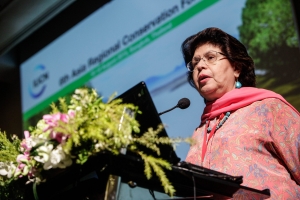Building resilience must be a priority in Asia
At IUCN Asia’s Regional Conservation Forum (RCF) last August, governments, private sector and NGOs were urged to work together to build solutions for people and nature.
Location: Bangkok, Thailand. 24th Aug 2015
Editor’s note: IUCN Asia hosts the Secretariat of Mangroves for the Future (MFF). MFF was featured during the RCF in side events and at an MFF booth of knowledge products. The article below is the closing statement to the forum. The MFF initiative is a key example of a community-based approach to building resilience in coastal communities in the region.
“2015 is a turning point for Asia – and we need to work urgently to secure nature and the well being of people with the same dynamism and innovation that has fuelled Asia’s growth,” said IUCN Asia Regional Director Aban Marker Kabraji.
“At the Regional Conservation Forum we have focused on how different sectors can build these solutions together. Moving forward, we need to ensure that the work to build resilience – which is rooted in protecting and conserving nature – is happening on the ground where it matters most.”
The forum, which ended August 12, provided a platform for leaders from all sectors of society to discuss nature-based solutions to environmental, economic, and social challenges in Asia. Under the theme of “Resilience in action: creating solutions for people and nature,” the forum addressed issues such as valuing and conserving nature, effective and equitable governance of nature’s use and deploying nature-based solutions to address societal challenges. Co-hosted by the Ministry of Natural Resources and Environment of the Royal Thai Government, it brought together more than 400 delegates from governments, NGOs, research and academic institutions and the private sector from 26 countries in Asia and beyond.
The forum is the key venue where all IUCN Members in Asia come together to convene on Asia’s contributions and commitments to the World Conservation Congress in 2016. This Membership includes 14 State Members in Asia, among them the Government of Thailand.
There were 18 side events during the forum, covering a wide variety of topics from species to business and biodiversity. Mangroves for the Future, a regional initiative co-chaired by IUCN and the United Nations Development Program (UNDP), was featured in two side events. “Mangrove Polyculture: A Model for Sustainable Production and Business?” focused on approaches being pursued by IUCN’s Mangroves and Markets project as well as Mangroves For the Future.
In another side event, “Nature-based solutions to DRR: moving from theory to actions on the ground,” the grants under Mangroves for the Future were presented as projects which help build resilience using an Ecosystems-based Approach (EbA). The results of these projects include more resilient communities through diversification of incomes and empowerment.
The plenary sessions and side events during the RCF showcased new ideas and best practice not only for programmatic work related to nature conservation, but have also examined the broader aspects of conservation work, including communications as well as collaboration with businesses.
By addressing the biodiversity and ecosystem challenges in an open and inclusive venue, discussions held during the RCF are vital contributions that are helping set the region’s conservation agenda for the coming years. The outcomes of the Regional Conservation Forum will feed into further developing the IUCN Programme 2017-20 which will be presented at the IUCN World Conservation Congress in Hawai'i in September 2016.

IUCN Regional Director Aban Marker Kabraji speaks at the RCF ... , Bangkok, Thailand © IUCN, 2015